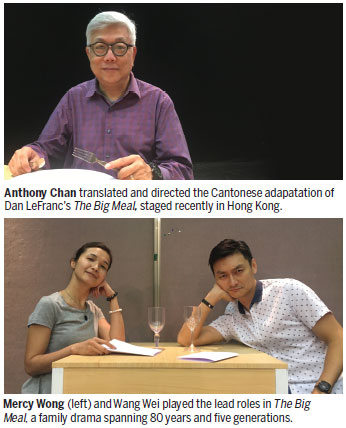Bringing a foreign play to the table
Updated: 2018-06-15 06:23
By Li Meng(HK Edition)
|
|||||||
Renowned American playwright Dan LeFranc wrote a seriocomic play, The Big Meal, six years ago. It had a simple theme: dining. Setting the plot in a suburban restaurant, the award-winning playwright telescoped the stories of five generations into a 90-minute work, discussing the consequences of raising a family, both positive and negative.
The Big Meal premiered off-Broadway in 2012 and then toured the US and Europe. "Deeply touched" by LeFranc's work, Anthony Chan, artistic director of Hong Kong Repertory Theatre (HKRT), translated the script into Cantonese. Eight actors from HKRT performed the play in Hong Kong City Hall recently as a curtain-raiser of the company's 2018-19 season.
According to Chan, although the story in the original play takes place in an American city, the ups and downs the family in it goes through and the dynamic between them follow universal themes. The long history of a family, spanning nearly 80 years, is revealed through a bittersweet journey. Interwoven into it are stories of birth and death, of love won and lost.
Nonetheless, to shorten the distance between the original story and local audiences, Chan changed the setting from a foreign restaurant to a local dining room and wrote the dialogues to match Cantonese culture.
"The whole work seems like a mirror through which individual stories, family history and social and cultural circumstances are reflected," says Chan.
Sam and Nicole are the central figures in the play. They meet, get married, have children, confront marital problems and other hazards of life. Experienced actors Wang Wei and Mercy Wong have played the parts of the troubled couple in the HKRT adaptation.
Nicole, played by Wong, used to be a rebel in her youth and was fed up of being constrained by family duties and responsibilities. When she first meets Sam in the restaurant she works in she tells him bluntly that she has no plans to get married. However, a minute later, they are on a date and are married soon afterwards. Initially, the couple is unwilling to have children, but in the blink of an eye, we see them trying to cope with the challenges of raising a newborn baby.
Sudden and unpredictable changes fill LeFranc's work. As he said in an interview, "The play is an expression of "how quickly life can change". Even as these changes take place, one's family plays a crucial role in one's life, observes Wang.
"The work reminds us of the influences our family had on us," he says.
Wang arrived in Hong Kong from Guangzhou in his 20s to pursue his acting dream. Like many other young people he was dying to get away from family life and carve a niche of his own. In the past two decades, he has established his career, built a family and raised two children. Becoming a husband and father helped him appreciate his parents and grandparents better, he says.
Both Wang and Wong can relate to the anxiety and pressures middle-aged people feel while dealing with their grown-up children. Wang, like Sam in the play, feels guilty about not being able to take care of his ailing father, as they live in different cities.
Wong too gets concerned about her own future particularly when the scene showing the old couple eating together is playing. She admits having a part in this family-themed drama has helped her rethink her own role as both a daughter and mother.
One of the most obvious revisions to the script comes at the end. Chan diluted the depressingly tragic end in the original play, giving it an optimistic spin.
"We show not only the difficulties and barriers in a family set-up, but also the bonds and attachment between family members," says Chan.

(HK Edition 06/15/2018 page11)